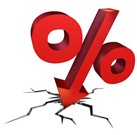The Government received good news on two fronts yesterday after leading economists forecast that rock-bottom interest rates are here to stay, while year-end tax figures massively beat expectations.
Analysts said that with eurozone inflation staying stubbornly low the ECB may only start hiking rates as late as 2019, providing a further boost to the prospects for whoever forms the next government after the looming election.
That means the cost for homeowners paying off tracker mortgages will stay low for several more years, while more pressure will likely build on the banks during the election campaign to lower their standard variable mortgage rates, which John Lowe, The Money Doctor claims are still far too high where average EU rates are around 2.5%.
Philip O’Sullivan, chief economist at Investec Ireland, said the ECB’s main interest rates, which are close to zero, will only start to rise in the spring of 2019 because inflation in the eurozone remains muted. ..“This is good news for Irish businesses and Irish households.”
“The timing of any rate rise will have a lot to do with the outlook of crude oil prices, but the ECB would not likely start hiking rates before 2018” said Alan McQuaid, chief economist at Merrion Capital.
“My personal view is that the ECB won’t countenance a rate rise for at least two years,” said David McNamara, economist at Davy Stockbrokers.
As the economy boomed, the year-end exchequer figures published yesterday showed the State took in €45.6bn in tax revenue last year, €3.3bn more than it had anticipated a year earlier. About 70%, or €2.3bn, of the unexpected haul was accounted for by an unexpected surge in corporate tax receipts. Company tax receipts may have climbed because Irish-based exporters boosted by a slump in the euro had a record year, and paid more taxes on increased profits to the exchequer as a result.
However, amid the enduring mystery about the exact nature of the corporate tax bounty, Finance Minister Michael Noonan and Budget Minister Brendan Howlin told reporters they were satisfied most parts of the economy were performing well. Saying the Government’s budget sums did not rely on corporate tax receipts, the ministers predicted that Ireland, under how the EU measures annual deficits, would strike a balanced budget in 2017, meaning the door was open to whoever formed the next government to spend more on improving frayed public services.
Most analysts say such is the momentum of the economy and the pace of growing tax revenues that the budget will be in balance this year. Despite the Government’s pre-election spending spree, the booming economy helped reduce the budget deficit sharply to 1.5% of GDP in 2015, said Dermot O’Leary, chief economist at Goodbody Stockbrokers, and “balance is now in sight”.
Chambers Ireland said the priority should now be on reducing the country’s debt burden and using the growing tax revenues “to invest in the capital infrastructure necessary to support future economic growth”.
“A note of caution is if we become over-reliant on rising corporate tax receipts,” said Peter Vale, tax partner at Grant Thornton. However, he added: “All the indications are that we will see an even better performance in 2016 as the domestic economy grows further and Ireland continues to remain attractive to international investment.”

